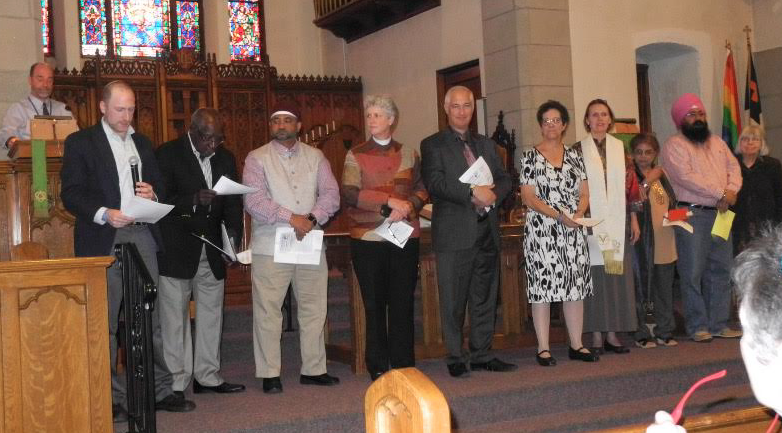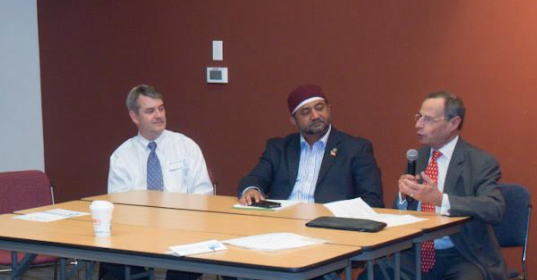Promoting a Culture of Peace in an Age of Violence
 We live in an age when violence is rampant. If we did away with all the various classifications of violence that reduce its perceived volume; terrorism, mass killings, homicides, manslaughter, war, insurgencies, rebellions, preemptive wars and so on and so forth, and clubbed them all under one rubric – people killing people – then even the news headlines would be deadly. People would just die of fright at the violence our species unleashes on its kind.
We live in an age when violence is rampant. If we did away with all the various classifications of violence that reduce its perceived volume; terrorism, mass killings, homicides, manslaughter, war, insurgencies, rebellions, preemptive wars and so on and so forth, and clubbed them all under one rubric – people killing people – then even the news headlines would be deadly. People would just die of fright at the violence our species unleashes on its kind.
According to the Quran (2:30), when God created Adam and informed the angels that he was sending Adam and his progeny as his deputies on Earth, the angels appear to be horrified at the prospect. They said to their Lord, “Will you place on Earth those who will cause corruption and shed blood? And he replied, “I know that which you don’t”.
It is easy to see the beast that the Angels saw in Adam. What is often difficult to apprehend is the urge for nobility, for transcendence, for peace, that God saw in Adam. One has to look at the human condition across time to recognize the progress of civilization and the steady manifestation of the moral agency, that God saw in humanity.
Fortunately, we saw a glimpse of that moral agency surface as an urge for peace among Delawareans this week. The children of Adam in Delaware, organized a week dedicated to peace with the goal to nurture a culture of peace and development in the First State. The organizers tell me that Peace Week Delaware was the first of what will be an annual event.
The Peace Week was organized by The Movement for a Culture of Peace and Community partners. It included peace marches, events designed to promote nonviolence, raise awareness of injustices prevalent in our societies (racism, gender discrimination, religious prejudice to name but a few), and several interfaith events. In total over thirty events were organized by advocates of peace. I participated in three events. All of them were interfaith affairs, and so I can only speak of those events. But readers can learn about all the events on the Delaware Peace Week’s website.
Interfaith Potluck
The first event I attended was held on Sept. 18th and it was an interfaith potluck called “Breaking Bread Together”. People of different faiths were given the opportunity to have a meal with their Muslim neighbors. The event was hosted by the Episcopal Church of Saints Andrew and Matthew in Wilmington. It was cosponsored by Masjid Isa Ibn Maryam from Newark, DE. The mosque’s name translates into English as the Mosque of Jesus son of Mary. So in a way the potluck was hosted by Andrew, Mathews, Jesus (Peace be upon him) and Mary.
Even though Masjid Isa has a very small congregation, varying between 200-250 on Fridays, it has become the most intellectually active mosque in Delaware, hosting many events, often in partnership with the Delaware Council on Global and Muslim Affairs.
The fellowship at the potluck was heartwarming to watch. As I observed people reach out to each other with genuine warmth and curiosity it restored my confidence in the idea that true faith has the power to unite and foster peace. It is only when religion is deployed in the service of politics that it becomes a source of conflict rather than comfort.
Messages of Peace
On September 22nd, I participated in a dialogue on peace messages of Judaism, Christianity and Islam. The event was held at the Dover Public Library and was sponsored by Wesley United Methodist Church and Christ Episcopal Church. My co-panelists included, pastors Amy Yarnall and Tom Passmore and Rabbi Douglas Krantz. It was a fascinating dialogue. Rabbi Krantz, who never ceases to inspire, spoke very eloquently about the Jewish tradition of peace, its aspirational nature, and how it now clashes with the militarized consciousness of Israel. He explained that Shalom in Jewish tradition meant to become complete.
I constructed my talk around the 208th verse in the second chapter of the Quran: Oh You who believe enter into peace completely. I argued that in spite of what some Muslims do in the name of Islam, the sacred sources clearly suggest that the ultimate purpose of Islam was unreserved submission to peace and like Shalom in Judaism, a Muslim was complete only when she committed to peace completely.
We had a very absorbing conversation about faith, politics, war and peace with the audience after our talks and it was a joy to engage with such a well-intentioned and knowledgeable crowd.

Faithful to Peace
I was also fortunate to participate in a very beautiful event on the final day of the Peace Week. It was hosted by the Hanover Presbyterian Church in Wilmington and it brought representatives of ten faith traditions together to share their visions of peacemaking. It was followed by breakaway sessions to discuss peacemaking.
An interesting element at this event was how both Rabbi Michael Beals of congregation Beth Shalom and I used similar scriptures from our mutual traditions to talk about the virtues of peace making.
I confess I succumbed to the urge to speak about the mystical meanings of peace in Islam which emanate from one of God’s many names in the Quran – Al-Salam. Peace is a name and attribute of God and Muslims believe that one cannot make peace until one is at peace with Peace (Al-Salam). In a very poignant tradition Prophet Muhammad (peace be upon him) taught Muslims that making peace between people was of greater value than even performing prayers, fasting and giving charity. So for Muslims, knowing peace is to know an important attribute of God, to desire peace is to desire God, and to make peace is better than even performing all the rituals of Islam.
I feel blessed that I was able to participate in this noble effort and hope that it will be a bigger affair next year. May we value and work towards a culture of peace everywhere.







